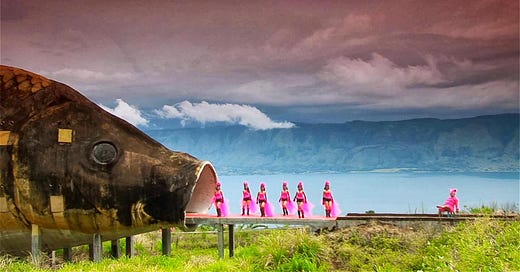Joshua Oppenheimer double bill: The Act of Killing (2012) + The Look of Silence (2014)
Saturday 9th of November, 12:45pm-6:30pm in the Richard Hoggart Building Cinema
Join us on Saturday the 9th of November from 12:45pm for our first screening of term (see our full term programme here): a double bill of Joshua Oppenheimer’s landmark documentary The Act of Killing (2012) and its companion piece The Look of Silence (2014). The first film will start at 1pm and run for 2 hours 47 minutes, concluding by 3:50pm. There will then be a nearly one-hour break. The second film will start at 4:45pm, running for 1 hour 43 minutes and concluding by 6:30pm. A major sensation – for a documentary film – on its initial release in 2012, The Act of Killing was first shown in cinemas in a 120-minute cut, and then by some television networks in a 95-minute version. What we are screening is the full director’s cut.
The subject of both films is the 1965-6 campaign of mass murder against Communists and suspected sympathisers carried out by the Indonesian military, with US support (down to supplying lists of names for murder). In 1965, Indonesia had the third-largest Communist Party in the world, after the USSR and China. An abortive coup by a faction within the army on the 1st of October that year - the so-called Thirtieth of September Movement - was (wrongly) blamed on the Indonesian Communist Party (PKI) and used as the pretext for a bloody purge of the PKI and its alleged supporters, in which between half and one million people were murdered. This event formed the basis of a genuine, right-wing coup against the first president of Indonesia and leader of its independence struggle against Dutch colonialism, Sukarno, and the elevation to power of General Suharto, a staunchly anticommunist ally of the US who ruled the country until mass protests forced his resignation in 1998. These events are central to Vincent Bevins’s important 2020 book, The Jakarta Method: Washington's Anticommunist Crusade and the Mass Murder Program that Shaped Our World, which argues that the 1965-6 purges formed a template Washington encouraged other right-wing movements to copy to suppress the organised left in their countries.
In both films, Oppenheimer exploits the impunity the Indonesian state has allowed those involved in the mass killings to interview many of the killers on screen, without any anonymisation, encouraging them to demonstrate the killings in which they were involved, and even going so far as to give them cameras to film their own re-enactments. The results are fairly jaw-dropping. The Look of Silence follows up the first film by focusing on the story of a middle-aged Indonesian man whose brother was murdered in the purges, who watches footage from the original film, including video of the men who killed his brother, whom he decides to visit and interview. A number of Indonesian crew were heavily involved in the filming, editing and direction of the film, but most had to remain uncredited for fear of legal and extrajudicial reprisals against those involved.
Both films were nominated for the Academy Award for Best Documentary, and won a number of film festival prizes. The Act of Killing was named the best film of 2013 by Sight and Sound and The Guardian, the 19th best documentary film of all time in a 2015 BFI poll, and one of the top 20 films of the 21st century so far in polls by the BBC and The Guardian.


